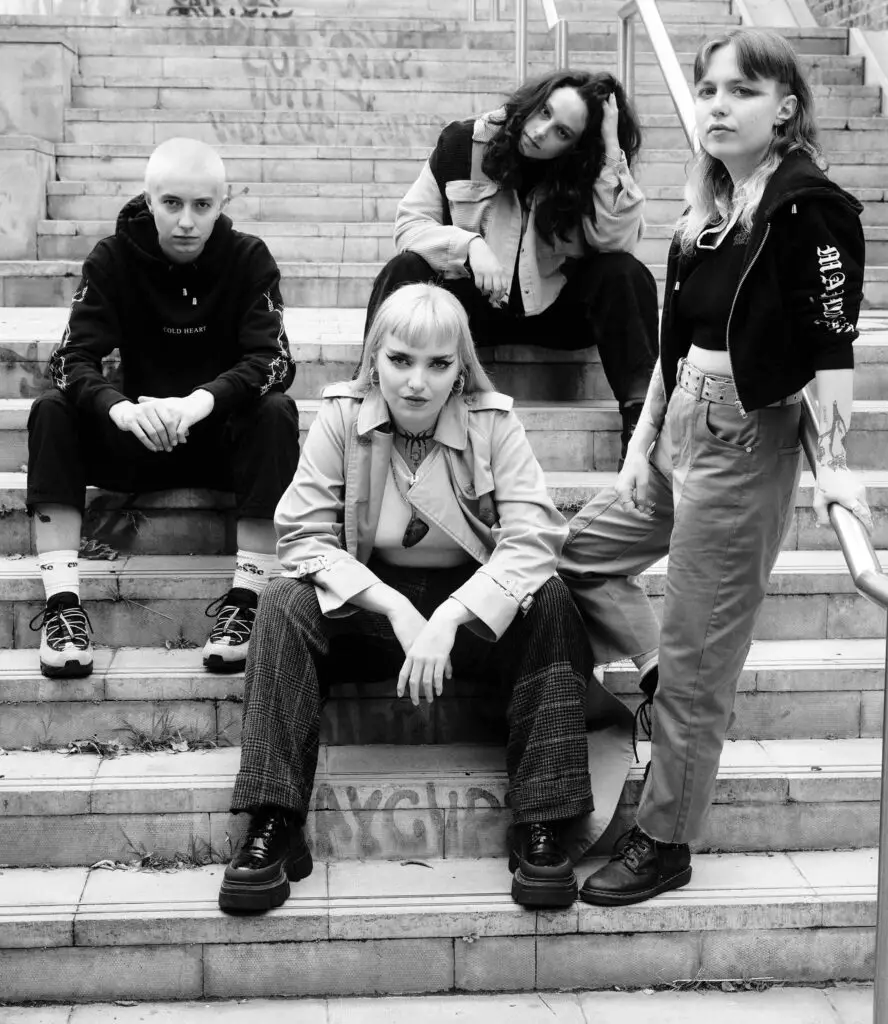On the opening track of Witch Fever’s debut album ‘Congregation’, singer Amy Walpole furiously wails the pious mantra ‘Blessed Be Thy’ – the song’s title, but also the name of a hymn she used to sing in church every weekend growing up. It’s a ferociously irreverent introduction to an album that rejects religion, the patriarchy, and everything powerful institutions uphold at every turn.
Having grown up in a Charismatic Church – a type of Christianity that believes in the power of the Holy Spirit, modern-day miracles and speaking in tongues – Walpole channels years of repressed rage on ‘Congregation’, expelled through powerful, lustral screams and defiant waves of doomy punk.
Since the Manchester band – also made up of Alex Thompson (bass), Alisha Yarwood (guitar) and Annabelle Joyce (drums) – released their fierce EP ‘Reincarnate’ this time last year, the hysterical energy that was bubbling then has reached boiling point, spilling over in a crunching debut that introduces you to Witch Fever at their loudest and most unapologetic. “We definitely needed to establish who we are as a band,” Walpole and Joyce tell The Forty-Five.
Hi guys! It feels very fitting that we’re chatting with you in October. Are you spooky season fans, and have you got any Halloween plans?
Amy: Hell yeah! Usually, for my Halloween, I just watch a scary film. I don’t go out for it or celebrate it unless we’ve got a gig. And I live in a block of flats so we don’t get trick-or-treaters either. Me and Annabelle used to live together in a house and we did Halloween once, and someone threw our pumpkin over a hedge and it was upsetting.
Your debut album ‘Congregation’ is out this month, about a year after the release of your EP ‘Reincarnate’. How have you grown as a band in that time?
Amy: I’d say we’re way closer. When I think that we’re too close, something happens and we’re even closer. I think touring does that. We all just know each other so well, which is really nice. There are definitely parts of myself that I wouldn’t have liked them to have seen. Annabelle for example, has literally seen me shitting in a wood, so that’s interesting. Alex has had to inspect me like a gynaecologist because I had a rash. It’s all basically just me. Everyone’s seen too much of me.
We all know each other so well. Anabelle has seen me shitting in a wood. Alex has had to inspect me like a gynaecologist. Everyone’s seen to much of me.
Amy Walpole, Witch Fever
You’ve had an amazing string of support gigs and tours over the past year – Bob Vylan, My Chemical Romance, Idles, Surfbort, Cancer Bats – how has it been and what have you learned from those experiences?
Annabelle: I think we’ve become more comfortable on stage. Before this, we hadn’t done a tour that was more than like a week. And then with [supporting] Idles, we got a stretch, and we’ve just learned how to be more chill.
Amy: I feel like we’ve learned how to treat it like more of a job. And, I don’t drink, but it’s definitely becoming less of like a pissup or an opportunity to get really fucked up every night. It’s even the same with a lot of bands that have been going for years and years. If you have the opportunity to get fucked up, it’s very easy to fall into the rhythm of that. But I think very early on, we realised that it’s just not sustainable and enjoyable. Now we have certain nights where it’s like a blowout night.
You’ve said ‘Congregation’ culminates in “full rage mode”. What allowed you to go even bigger and heavier for your debut album?
Annabelle: I think after releasing the EP, we’ve learned how to do more in the studio because we were always such a live band before that. So we’re a lot more comfortable with that. And I think we just got better at articulating in songs. We’ve got better at songwriting, I guess.
Amy: As a debut, we needed something that was really bolshy and was like, ‘This is what we’re about’. There are slower songs on it, and there’s songs that have a lot more space to them and songs that aren’t as angry. But we needed our first album to be something that would make an impression. And then the next album or the album after that, we can be more experimental and try new things. But we definitely needed to establish who we are as a band.
We needed our first album to be something that would make an impression.
Amy Walpole, Witch Fever
Amy, I get the impression that sometimes people are surprised that your voice can be so gravelly and heavy.
Amy: Oh my God, the amount of men that come up to me at gigs and say, ‘You’ve got such a big voice for such a tiny body!’ And I’m like, ‘Oh my God, you think that’s genuinely a compliment?’ But it makes me feel like I’m a toddler. I get it. I’m five foot, I’m very small, and I do have a very loud voice. But I’ve just trained my diaphragm. I’ve done it a lot, I’ve just learned to do it. It is funny when people are surprised.
Your recent single ‘I Saw You Dancing’ has a very appropriate Blair Witch-esque, horror-themed music video. How did you come up with the idea for that?
Amy: Our friend Sam O’Leary directed and wrote it. And we wanted like a Blair Witch vibe, but the song is obviously about my experiences in church, and me and Sam had this conversation where I was telling him about how we used to go on these weekends away with church once a year in these big weird, empty houses that usually was a sort of recreational centre for school kids to go on school trips. The whole church used to go there and stay, so it was kind of playing on that a little bit. [It’s] just my memories of being in this weird, fucking bleak farmhouse. We just wanted something unsettling.
A lot of the album’s themes cover your upbringing in the church and address patriarchal structures as an extension of that. How did you feel ready to delve into this as a creative source of influence?
Amy: I literally always have done. I did an art degree when I was 19 to 22. And I literally couldn’t stop making work about it, that was all I did. And then that ended up being what a lot of my songwriting was about, too. For the time that I was in the church for 16 years, my head had been filled up with all this biblical language, and this way of speaking and this way of expressing faith. And it was used as a way to oppress me as well, and oppress a lot of women and queer people in the church. And I guess it’s just fun to use it, and let it give me power, instead of the other way around.
Did singing in church help with your own confidence and artistic expression?
Amy: I was in the church band and I was a backing singer. And I used to get told off for drawing all the attention because I used to riff on different notes or belt too loud. And I’d get told off for trying to get attention because that’s not ladylike to do that. But definitely, being in the church band gave me confidence to actually be on a stage and stand up in front of people. And who knows, if I wasn’t in the church band maybe I would have never been doing this. So thanks, guys.
If I wasn’t in a church band, maybe I would never have been doing this. So thanks, guys!
Amy Walpole, Witch Fever
I love how much unapologetic rage there is on the album. What do you think is important about showing that anger and being able to channel it?
Annabelle: I think it’s important to show that it can be a positive thing. Rage doesn’t have to be something where you’re just blind and it’s not directed towards oppressive things. I think that’s important because, if you stay quiet about those things, nothing changes. And it’s also important for yourself to get rid of the rage.
Amy: It’s true. And also, we are definitely in a position of privilege where we can do this without any fatal backlash. We don’t get loads of serious threats. It’s not like the activist group Pussy Riot, they’re constantly in and out of prison just for expressing their beliefs. So we are privileged to be able to do that, and I am privileged to be able to say basically whatever the fuck I wanna say, and there’s no real danger in that.
Having started as a band in 2017, there’s been a lot of societal change in the past five years with more people speaking up about problems for women and non-binary people in the music industry. Have you witnessed first-hand anything changing for the better?
Annabelle: I’ve seen a few guy bands where they’re holding someone in the band accountable and booting them out. I don’t know if that’s changed massively, but it feels like it’s becoming more of a thing.
Amy: It feels like there’s more support now. We played a gig a few weeks ago, and Alex and Annabelle got cat-called by two members of the audience when we were on stage. And one of the guys that did it, he got kicked out for the rest of the gig. Stuff like that, it feels like for the most part, is being taken way more seriously, which is good. But it is still difficult, to be honest.

You’ve spoken about the final track on the album, ‘12’ (which is actually the 13th song) being the most confronting and difficult for people to hear. Why did you decide to place that track at the end?
Amy: We put it on the end of the album because the twelfth track feels like it’s an actual end to the album, because it ends really softly and it does feel like a body of work that’s come to an end. And we just decided to put ‘12’ on the end. Because it’s got this relentless feeling of like, ‘We’re not done yet. You thought we might be, but we’re not done!’ And we’ve ended with the most angry, heavy one. It didn’t feel right to end a Witch Fever album on a slow track, as much as it sounds like it could have done.
What are your hopes for how the album will be received or empower people?
Annabelle: I think it’s good for people to be able to relate to the songs in whatever way they do, and whatever it’s about they can make their own thing of it, and that be empowering or cathartic.
Amy: I agree. I also feel like it’s totally okay if all you take from it is that you enjoyed it and it’s fun, and that you like listening to it. I don’t feel like it needs to resonate with everyone on a really deep level for it to be enjoyable. Because at the end of the day, it is music, and we’re doing it because we enjoy it. But I do like that people can relate to it in their own ways. As much as with a lot of the songs, I’m singing about specific experiences that I’ve had, I feel like it’s vague enough to be able to be applied to different situations, too.
‘Congregation’ is out October 21 via Music For Nations.
READ MORE: The best songs about witches and witchcraft


